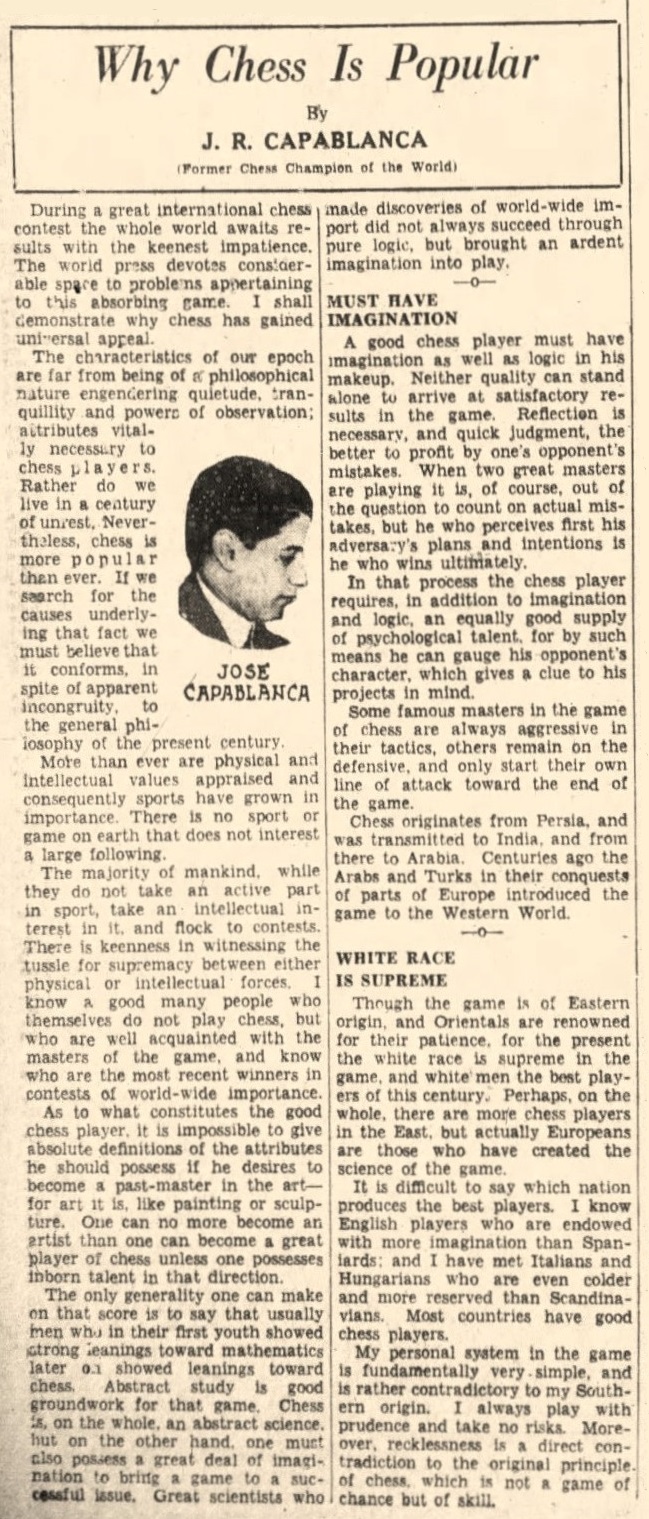
Edward Winter

Brooklyn Daily Eagle, 14 February 1930, page 24
‘During a great international chess contest the whole world awaits results with the keenest impatience. The world press devotes considerable space to problems appertaining to this absorbing game. I shall demonstrate why chess has gained universal appeal.
The characteristics of our epoch are far from being of a philosophical nature engendering quietude, tranquillity and powers of observation, attributes vitally necessary to chess players. Rather do we live in a century of unrest. Nevertheless, chess is more popular than ever. If we search for the causes underlying that fact we must believe that it conforms, in spite of apparent incongruity, to the general philosophy of the present century.
More than ever are physical and intellectual values appraised and consequently sports have grown in importance. There is no sport or game on earth that does not interest a large following.
The majority of mankind, while they do not take an active part in sport, take an intellectual interest in it, and flock to contests. There is keenness in witnessing the tussle for supremacy between either physical or intellectual forces. I know a good many people who themselves do not play chess, but who are well acquainted with the masters of the game, and know who are the most recent winners in contests of world-wide importance.
As to what constitutes the good chess player, it is impossible to give absolute definitions of the attributes he should possess if he desires to become a past-master in the art – for art it is, like painting or sculpture. One can no more become an artist than one can become a great player of chess unless one possesses inborn talent in that direction.
The only generality one can make on that score is to say that usually men who in their first youth showed strong leanings toward mathematics later on showed leanings toward chess. Abstract study is good groundwork for that game. Chess is, on the whole, an abstract science, but on the other hand, one must also possess a great deal of imagination to bring a game to a successful issue. Great scientists who made discoveries of world-wide import did not always succeed through pure logic, but brought an ardent imagination into play.
MUST HAVE IMAGINATION
A good chess player must have imagination as well as logic in his makeup. Neither quality can stand alone to arrive at satisfactory results in the game. Reflection is necessary, and quick judgment, the better to profit by one’s opponent’s mistakes. When two great masters are playing it is, of course, out of the question to count on actual mistakes, but he who perceives first his adversary’s plans and intentions is he who wins ultimately.
In that process the chess player requires, in addition to imagination and logic, an equally good supply of psychological talent, for by such means he can gauge his opponent’s character, which gives a clue to his projects in mind.
Some famous masters in the game of chess are always aggressive in their tactics, others remain on the defensive, and only start their own line of attack toward the end of the game.
Chess originates from Persia, and was transmitted to India, and from there to Arabia. Centuries ago the Arabs and Turks in their conquests of parts of Europe introduced the game to the Western World.
WHITE RACE IS SUPREME
Though the game is of Eastern origin, and Orientals are renowned for their patience, for the present the white race is supreme in the game, and white men the best players of this century. Perhaps, on the whole, there are more chess players in the East, but actually Europeans are those who have created the science of the game.
It is difficult to say which nation produces the best players. I know English players who are endowed with more imagination than Spaniards; and I have met Italians and Hungarians who are even colder and more reserved than Scandinavians. Most countries have good chess players.
My personal system in the game is fundamentally very simple, and is rather contradictory to my Southern origin. I always play with prudence and take no risks. Moreover, recklessness is a direct contradiction to the original principle of chess, which is not a game of chance but of skill.’
Endnote 12 on page 326 of our 1989 book on Capablanca:
Capablanca-Magazine, February 1944 (page 59) printed an article entitled ‘Why Chess Is Popular’, stating that it had appeared in ‘The Standard’, London in 1929. The Evening Standard newspaper was presumably meant, but the original publication has not been found.
To the Archives
for other feature articles.
Copyright Edward Winter. All rights reserved.